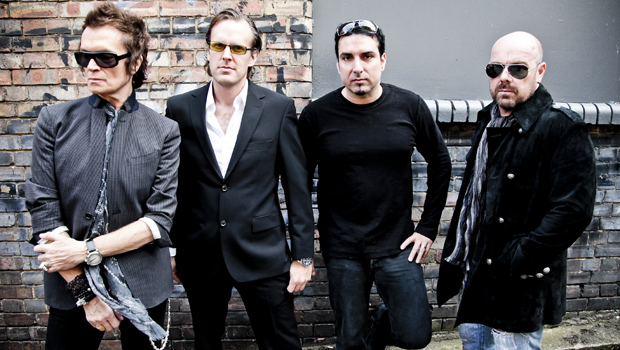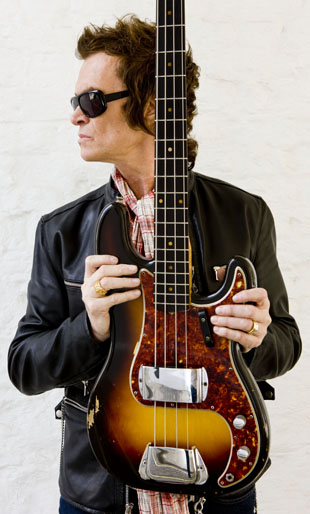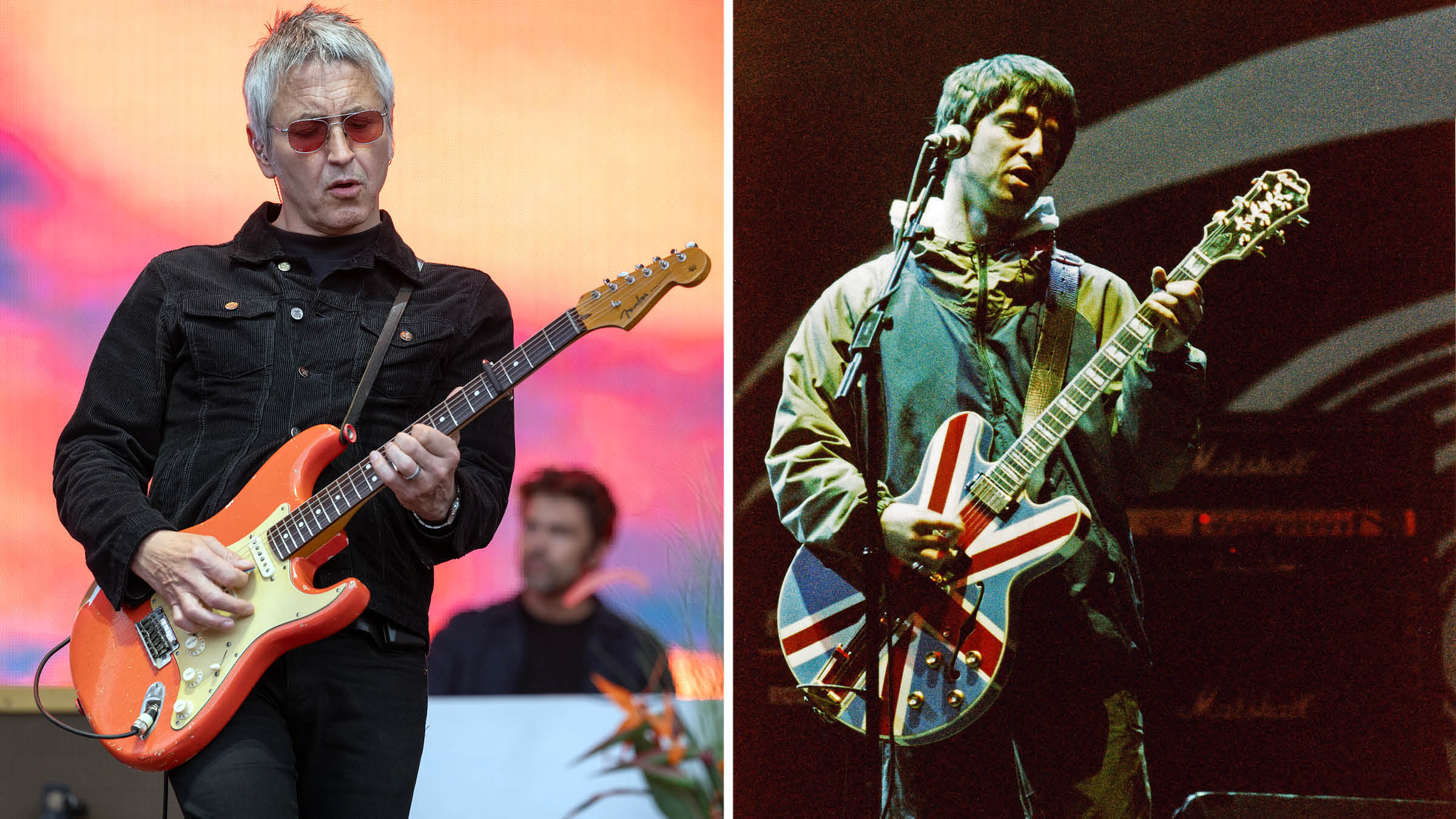Interview: Glenn Hughes of Black Country Communion on the New Album, '2,' His Autobiography and His Favorite Bass

Producer Kevin Shirley, who has worked with the Black Crowes, Aerosmith and Journey, was attending Guitar Center's King of the Blues event in Los Angeles in November 2009 when he happened upon an inspirational sight — a jam session involving master blues guitarist Joe Bonamassa and legendary bassist and frontman Glenn Hughes.
The combination of the younger Bonamassa, who cut his teeth in the band Bloodline and has shared the stage with his mentor, B.B. King, and other great blues players, and Hughes, who, of course, is a veteran of the music world and has played with everyone from Ritchie Blackmore, Tony Iommi and Pat Travers, to name a few, literally struck a chord within Shirley.
After the jam, the producer threw out a proposition for the duo to form a band. Hughes and Bonamassa agreed and upped the ante by adding drummer Jason Bonham (Air Rise, Foreigner) and keyboardist Derek Sherinian (Alice Cooper and Dream Theater) to the lineup.
The result was Black Country Communion, named after Britain's industrial area that was once Hughes' and Bonham's stomping grounds. Last September, the quartet released its Shirley-produced, self-titled debut, which Hughes calls 1, to critical raves, including landing the No. 3 spot on Classic Rock Magazine's Critic's Album of the Year poll.
The group was also named Planet Rock Radio listeners' Best New Band of 2010.
Back in June, Black Country Communion unleashed a new disc, 2, also produced by Shirley, and took off on a world tour. Guitar World caught up with Hughes, via email, while he was chillin' in the U.K., to talk about the new album, his career, basses and his book, Glenn Hughes: The Autobiography from Deep Purple to Black Country Communion, which Hughes co-wrote with Joel McIver.
GUITAR WORLD: When Black Country Communion's debut album was released 2010, you had said the album was a milestone because it documented your return to straight-forward rock after playing funk for years. Was there another milestone passed with the release of 2 last month? If so, what was it?
All the latest guitar news, interviews, lessons, reviews, deals and more, direct to your inbox!
There are many milestones in life. My life centers around songwriting. As soon as I put my rock hat back on in late '09, it was full steam ahead with 1. With 2, I was focused on continuing the path I formulated with 1. I'm not a coulda, woulda, shoulda guy, but I'm really happy I made my return home to rock 'n' roll.

Now that you've worked with the guys — Jason, Derek, Joe and Kevin — for the past couple of years, was it easier making 2 than it was making the first album?
Yes, of course. Being in a band of friends is super important. There is also a tremendous amount of trust, on both a personal and musical level.
Did you feel any pressure going into the studio to record 2 after the critical acclaim the debut album received? If so, how did you deal with it?
I love a challenge, and also understood where we were going musically. I wrote 20 ideas for songs for 2. I always like to have lots of sketches, although it never used to be this way. [These days] I don't question it, I have fallen in love again with songwriting.
Throughout your career, you've played with an array of guitarists — Pat Thrall, Tony Iommi, Ritchie Blackmore, and, of course, Joe. How have they all influenced the way you have approached your playing?
I've been blessed to play with the greats. They have all influenced me in some way. Blackmore, Iommi, the late Gary Moore, Pat Thrall, the late Mel Galley, John Frusciante, Jerry Cantrell and now Joe. Joe is a beautiful human — the real deal — honest as the day is long and plays guitar like no other. I'm proud that he is my partner.
Why was the bass your choice of instrument, and how old were you when you got your first?
My first choice -- well, not mine -- was trombone in the school orchestra, where I learned to read music. Then I heard the Beatles and the Stones, and Mom bought me an electric guitar. I played lead for four years and then switched to bass. One day someone suggested that I should sing, so I sheepishly stepped up to the microphone and the rest is rock history.
If you were marooned on a desert island and only able to have one bass with you, which one would it be and why?
I have more than 100 basses, but It would be my Bill Nash '57 Precision Bass — the Dakota Red one I'm playin' now. Hey, that bass is an icon all on its own! It rules! It blows me away!
In November, the paperback edition of your the book, Glenn Hughes: The Autobiography from Deep Purple to Black Country Communion, will be released via Jawbone Press. Have you been thinking about writing a book for some time?
I was asked 20 years ago to write my autobiography, and I declined. It was five years ago when I started to write this one. I had to go back and dig some stuff up that was a little uncomfortable but was necessary to move forward with my life. You only get to write your auto once, so I had to get rigorously honest.
As you reflected on your career for the book, what were some of the major highlights?
Learning in my early teens that I had a gift. I adored learning to play guitar, bass and keys. There's also finding my voice, and meeting my mentor Stevie Wonder, who was very generous with his time. Giving back is a big thing in my life.
What were some of the challenges?
Playin' bass runs and singin' lead vox, is sometimes difficult, but I have three words for you: Practice, practice, practice!
Lastly, is there any advice you would give to a young bassist who wants to keep his integrity in the sometimes manipulative music business?
Listen to your inner-voice: Surround yourself with loving, nurturing people. Fall in love with your art and find yourself. Music is the great communicator.
